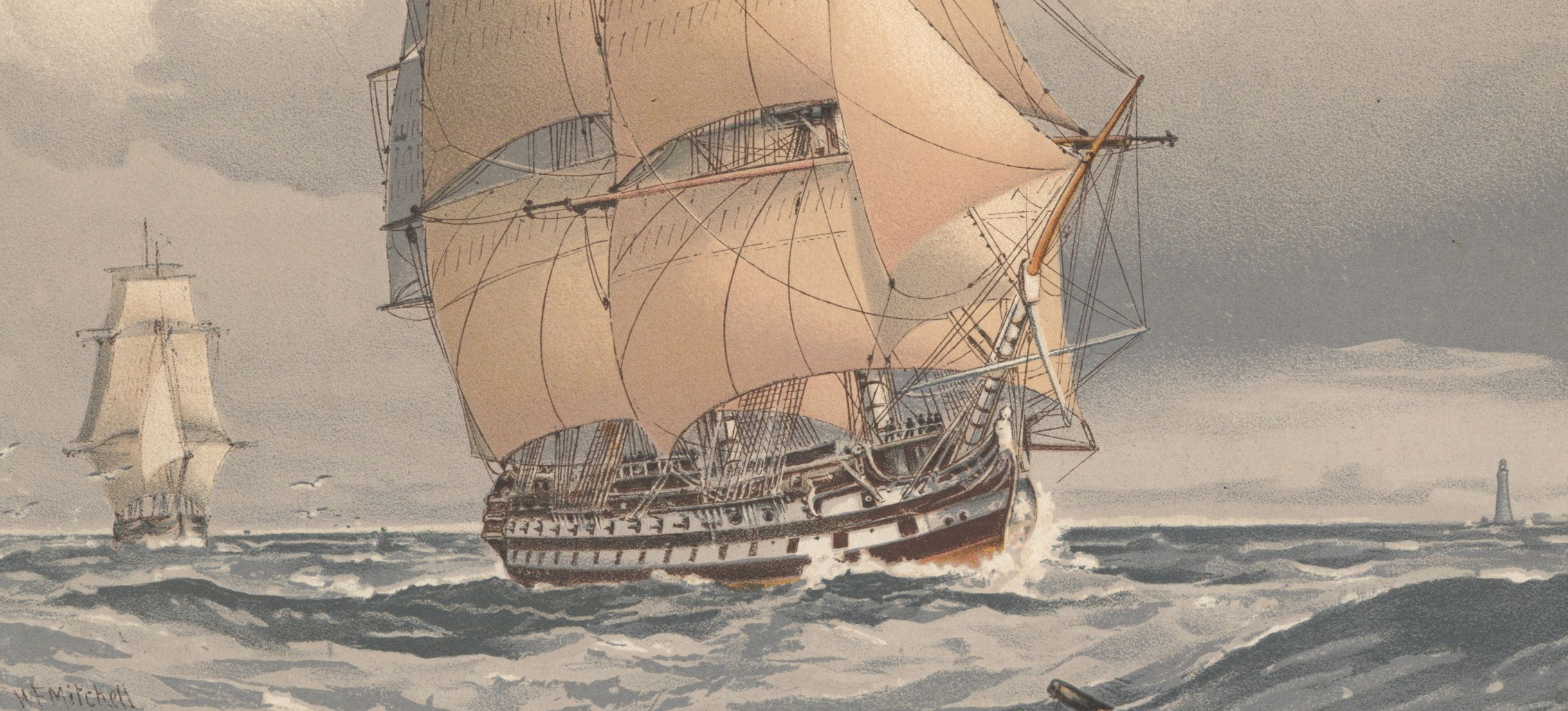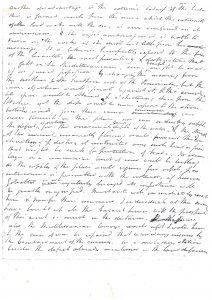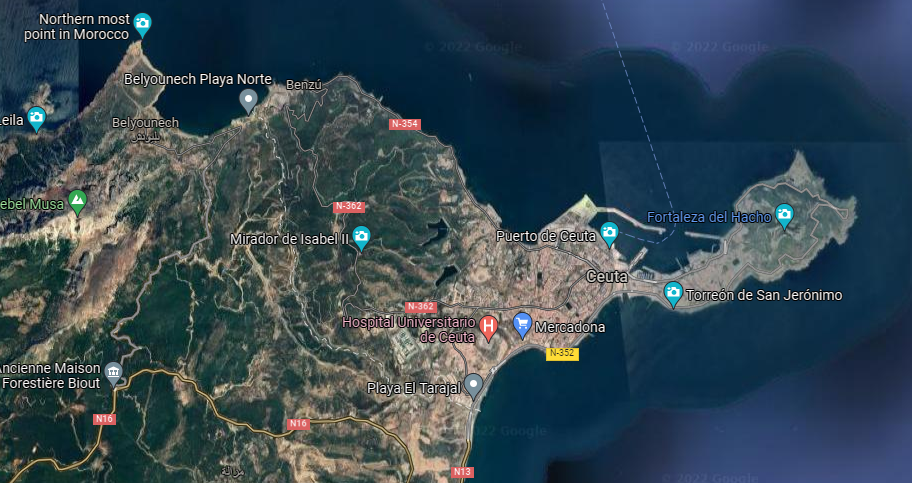
The Ceuta papers
21 February 2022The Cadiz journal
21 February 2022
The Ceuta report comprises two documents which are quite clearly continuous. They appear to be something of a report on the defences of Ceuta and of the author’s time in the city. The first three pages are missing and we pick up the story on page 4 …
You can view or download the original pages by clicking on the links on the right. We would welcome alternative transcriptions or suggestions as to the missing words.
[A4] … Another disadvantage is the extreme badness of the harbour. This is formed merely from the curve which the extremity of the land make with the sea, is very confined in its dimensions. The vessel anchoring in it is liable to [be] driven on the rocks if she drifts but little from her moorings. It is likewise completely exposed to the fury of the levanter, the most prevailing & destructive that is felt in the Mediterranean. Some benefit might be made if we gained possession by changing the mooring from the Northern to the Southern side of the Peninsula, but the same objection would operate against it, & tho‘ considerable space would be obtained & a sheltering shore from the S. Westers, yet the ship would be more exposed to the stron (sic) Easterly wind.

From these causes (“merchandizing“) commerce can never flourish in this place, nor can industry supply the defects of nature. For the [occasional] depth of the water & the strength of the current invariably flowing would prevent the constructing of, & destroy if constructed, any such head or pier that might be sunk for protection of trade. Its advantages in a commercial point of view would be trifling as the supply of the place would require [few] vessels & no intercourse is permitted with the interior. If, however, Gibraltar is ever regularly besieged its importance will be greatly magnified. Merchants will immediately resort here & transfer their commerce & individuals at this reason have bought up all the vacant houses with the prospect of this event so much in the distance. In that case also the Mediterranean Convoys would refit & water here & the men of war be repaired that received any injury by the bombardment of the enemy. As a military station besides the defects already mentioned in the land defences …
[A5] … an enemy effecting a landing on the Barbary Coast might without difficulty batter the town to pieces by a regular bombardment as the houses are built immediately adjoining the works instead of being out of the reach of shells.
Its chief advantage to us would be giving the entire command of the straight, & therefore greater opportunities of annoying or destroying the enemies navy & preventing any fleet pass without our observation. For this purpose some light vessels should constantly cruise in the midd channel and even without this if a proper lookout is kept at the signals station there is little fear of an enemies fleet passing without being seen by one side or the other. In former times the French always sailed along the African shore, & tho‘ the distance over is so small often creeped through in a thick fog. This was particularly the case in the fleet which Lord Nelson pursued to the West Indies. They passed during a fog along the opposite shore and when our fleet came up & enquired if they had seen them they replied that they had not passed through & our Admiral directed his course toward Malta where he found his mistake. This single instance is sufficient to prove its use with regard to large squadrons, & it equally applies to single ships & privateers. Another great advantage is the fertility of the soil & its production. Like Gibraltar on a single rock jutting out into the sea & protected from all attempts by sea by the rocks which surround it & by land by a fortress, wherein it differs as ours is a barren arid rock without any natural productions, & except in parts when ground is artificially made at great labour & expense, entirely uncultivated. Ceuta on the contrary immediately it emerges from the sea, like the Coral Islands in the South Pacific Ocean, is turned into a fruitful soil. The rock alone serves for a foundation & protects it from the violence of the sea & attempt of its enemies. Thus secured by a singular bounty of Nature the remainder …
[A6] … of this ground is adapted for agricultural purposes. The improvement & cultivation has been hitherto greatly neglected & tho capable of supplying itself, all its provision have been sent from Algeciras and other towns on the coast of Spain. The whole land which would produce corn for the consumption of the place is at present planted with vines & tunas1 & alone contributes to the luxuries not the necessaries of lif (sic) with a fatal policy too frequent with the Spaniards of preferring the ornamental to the useful, & no small part in consequence is not even planted with these.
Another indirect advantage is the prevention of the gunboats (tho rather a freedom from evil than a natural good) which used to issue from Linea2 during calms and when pursued took refuge under an island and the batteries of the place, an evil of no small moment. Besides this it is very mild & healthy & furnished with many things subservient to pleasure & amusement in which Gibraltar is deficient. The assertion that Ceuta is more healthy than Gibraltar may appear singular to those who only consider the short distance between the 2 places, but it is undoubtedly a true fact for the great height elevations of Gibraltar constantly catch the passing clouds, which descend during the rainy season in unceasing showers at once unhealthy & dangerous. Dangerous large portions of stone which are frequently hurled from the summit of the rock by these periodical torrents & occasion great injury to the houses below & endanger the lives of passengers. But the effects felt by this elevation during the Levanters are still more prejudicial, for the clouds then form a complete cap over the rock, & render the air thick & suffocating that it is scarcely possible either to see or breathe. And if it happens during the summer season, & continues any term, pestilential fevers are sure to follow.
[B2] … This defect our Engineers might obviate by a few salient angles thrown out at proper intervals.
The sides of this hill are covered with vines & prickly pear which constitute the chief food of the inhabitants in summer. The latter plant is laid out in regular rows & cultivated as in a garden. & an observatory is fixed at top from which all motions of vessels can be observed in Gibraltar & those passing & repassing the straights be easily discerned in allmost all weathers. From hence we returned by the opposite side of the promontory to the Town and then proceeded to examine the lines & the outermost posts.
The land defences of this Town are uncommonly beautiful, & exhibit that attention to grandeur as well as strength which is seen in the land gate of Cadiz; they are equally lofty & substantial & have the additional advantage of the ditches between 2 of the 4 walls being filled with the sea which considerably adds to the defence. On leaving the main street we passed a small bridge which might be divided in case the enemy had forced the outworks. The depth is sufficient for small craft to pass nearly through & might easily be deepened & form a basin for reception of our vessels in tempestuous weather: passing over this we found a few houses scattered in the suburbs & the principal Church in the Plaza, & immediately opposite the original line wall. This is exceedingly strong & resisted all the efforts of the Moors in their grand & continued attacks the marks of which are still visible in many places. Very little impression was made by continued bombardment & the security not the least endangered by it. At present this is protected by lines in front. The under part of this forms bomb-proof barracks. From this point to the outer gate are continued ranges of batteries on the most scientific principles & presenting a most tremendous front to its assailants. It appeared even more formidable than the land gates either of Cadiz or Gibraltar, tho‘ it was deficient in the simplicity which constitutes the excellence of both these places. Within this are 2 most excellent springs of water which supplies the whole …
[B3] … whole place most abundantly. The glacis3 to the works is undermined to a great extent, of which a tolerable idea could be formed through the apertures left for admitting the powder & for occasionally cleaning them out. There seems to be one deficit which must strike even an inexperienced person, which is that the fortifications are on the narrowest part & consequently exposed to a greater range of fire than it can oppose. It is also partly commanded by a hill in the neighbourhood, which cannot easily/well be defended (thus forming considerable … ?)4 because the hills rise gradually over each other for some distance. Also from being built at different times, it is irregular & is like a cone inverted, the front being higher than the back part. About 100 yards beyond the East wicket [gate] was the picket guard which is constantly kept on the alert for a Moorish jealousy prevents any one entering the Count[r]y through this place & have established it is necessary to keep their guard in check, & also prevent any surprise. They also protect the cattle which during the day are driven into the neutral ground for pasture.
6 of their cavalry accompanied us to the furthest boundary distinguished partly by a small creek partly by the declivity of a hill. On the latter we saw 2 or 3 Moors with their muskets wrapped up in thick cloaks & resembling old women; we were well prepared for them had they advanced but they did not show any disposition to annoy us & we were not willing to run any risques These fellows indeed make no scruple at firing at any one who comes within shot & a Spaniard unwarily approaching too near received a bullet through the crown of his hat but 4 days ago.
We then surveyed the remains of old Ceuta the walls of which are of tapier (sic) work and are still quite perfect in many parts. The extent of the city judging from these must have been considerable. The weather prevented our examining them particularly & it is also rather dangerous as the Moors are often concealed in the ruins.
We returned to a late dinner at Don de Gand5 the Governor who deferred it to a later hour on our account This Gentleman a Swiss by origin entered young into the Spanish service, connected himself by marriage to an ancient family & rose gradually to the rank of General of cavalry. From a fall which he received he is incapable of riding & received this Governorship …
[B4] … as a recompense for his services. He is of an amiable mild disposition yet possessing sufficient dignity & authority as to command respect & obedience, but his orders are issued with such suavity that they appear complied with more from regard to his person than the power he is invested with. His friends & family adore him, & he is so just, mild & vigilant in his government that whilst he satisfies the Junta & performs his duty to his country, not a single voice is raised with a complaint against among the numerous disterrados6 entrusted to his care – his wife is no less degree a pleasing amiable woman, but gifted with such loquacity that instead of gaining an answer, her silence creates such astonishment as to keep every one mute till she gains breath to begin again. However she possesses such good humor & uses such endeavour to make everyone comfortable that it would be ill tempered not to be satisfied with them.
Of 18 children 3 only remain alive, a son & 2 daughters. His heir is about 17 years old a capt in the army & lately married to a girl of his own age over whom he watches with an anxiety & jealousy only to be equalled by old Spanish novels. The girls might sit for pictures as the weird sisters & then have equal fascination but their power lies in their tongues not eyes. Besides the family the house is fully attended, the aid de Camps & chief people of the place who as usual are attracted by his affability & open table. For with a liberality worthy of example he keeps an open table where elegance & plenty not luxuries abound, and this from a moderate private fortune & a salary very inadequate to the dignity of his situation.
The Col of the Fixos7 was of the party, and had ordered his regiment out with the intention of reviewing them but during dinner countermanded them alledging that it would be too late; from this we formed opinion of the discipline of the corp, without requiring further knowledge. We spent this evening in a similar manner as the last in different tintulla [?] & continued our amusements to a late hour. During our excursion without the walls we were shown the spot where the Moors treacherously murdered a Spanish Officer which as an instance …
[B5] … of the modern Punica fides is worthy record.8 During the Governorship of Hashash9 & whilst Ceuta was closely invested a conference took place & overtures were made by both parties in the course of which a difference arose concerning the extent of some propositions made by Emperor & which the Spaniards complained he had not complied. This being reported to the Emperor of Morocco, he felt greatly indignant that his word should be doubted, & informed his General that he wondered he permitted the lie direct to be given him, adding that if the head of the Spanish officer who uttered this calumny was not produced in 24 hours his own life should answer for the Offence. Necessity & self defence, that strongest excuse for an unjust action, prompted10 him to the following cruel stratagem. He sent a flag of truce to the town requesting the former Officer would return to the conference, where he hoped everything would be settled to his wishes. On this he incautiously trusted himself as an Embassador into the hand of the Moors & was no sooner without the reach of the guns than he was overpowered by numbers, murdered on the spot & his head sent to the Emperor. This villanous act of Hashash was afterward repaid by the cruelties inflicted on him by the King himself. Hashash by continued success in mercantile affairs had accumulated an enormous property was invested with the governorship of the district & created commander of the forces, & by his justice & humanity had rendered himself idolized by the multitude. This property & popularity was too great not to attract the serious alarm & jealousy of his Sovereign, who fearful however of using force against a man of his influence determined to effect his destruction by cunning. He accordingly gave him a daughter in marriage, overpowered him with presents & dignities & used all his influence to attract him to his court where he might easily be destroyed by his emissaries. Hashash however had some suspicion of his intentions & was too cautious to trust himself out of his own territories & always sent a plausible excuse for his absence. At length the Emperor ordered him to a distant province with 12,000 men to exact their duties which they rebelliously refused to pay, where he met […]
- Another name for the prickly pear
- La Linea – the Spanish port city neighbouring Gibraltar
- An artificial slope leading down from a fortification
- the parentheses and space followed by “?” are the author’s. I suggest he was making these memoirs from a previously kept diary – PH
- Governor of Ceuta 1809–1810: Francisco Carlos Gabriel de Gand-Vialin, vizconde de Gand, and again in 1813
- Using World War II terminology, we would say DPs or Displaced Persons – PH
- Equivalent of the National Guard – reserve force
- The author refers to faith or trust placed in the Punice, another term for Poeni, the Phoenicians: Carthaginians who were settlers in North Africa from Phoenicia & renowned amongst the Romans for their faithlessness & breach of treaties – PH
- Abū al-Naṣr ibn Hashash, Muḥammad III conquered Ceuta in 1309
- ? there is a hole in the paper
